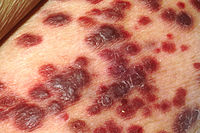
Photo from wikipedia
11063 Background: Few effective US FDA approved therapies exist for refractory, metastatic sarcomas. Many of these patients therefore enroll onto phase 1 clinical trials. Because tumor-specific outcomes are not always… Click to show full abstract
11063 Background: Few effective US FDA approved therapies exist for refractory, metastatic sarcomas. Many of these patients therefore enroll onto phase 1 clinical trials. Because tumor-specific outcomes are not always reported in less common cancers such as sarcomas, outcomes of sarcoma patients treated with novel immunotherapy and targeted therapy approaches remains unknown. Methods: We analyzed clinical and next generation sequencing data from all sarcoma patients treated on phase 1 trials at MD Anderson Cancer Center (MDACC) and performed logistic and Cox proportional hazards regression analyses to evaluate response rate (RR), median time to progression (mTTP), clinical benefit rate (CBR; defined as CR, PR, or SD > 6 months), and median overall survival (OS). Results: Among the 406 patients with advanced sarcomas (321 soft tissue sarcoma, 85 bone sarcomas) treated on phase 1 trials at MDACC from May 2006 to May 2018, median age was 53 (range 11-84), 48% were female, with a median 3 prior lines of therapy (range 0-9). The most commonly treated soft tissue sarcoma subtypes included leiomyosarcoma (n = 66; 16%), liposarcoma (n = 52; 13%), GIST (n = 44; 11%), UPS (n = 14; 3%), and synovial sarcoma (n = 11; 3%) and most commonly treated bone sarcomas included osteosarcoma (n = 34; 8%), chondrosarcoma (n = 28; 7%), and Ewing’s sarcoma (n = 25; 6%). RR was 7% (95% CI 5, 10), mTTP was 2.9 months (95%CI 2.6, 3.1), CBR was 24% (95% CI 20, 29), mOS was 17.2 months (95% CI 13.8, 20.8). 2 patients had a CR as best response, 1 chondrosarcoma patient treated with an anti-APO2L/Trail agent and 1 Ewing’s sarcoma patient treated with the combination of an IGF1R inhibitor plus mTOR inhibitor. 26 patients (6%) had a PR as best response using novel immunotherapies targeting PD1, PDL1 plus CCR4, CTLA4 plus KIT, and TLR7/8 and novel targeted therapies against TRK, LRRC15, cMET, mTOR, VEGF, MDM2, KIT/PDGFRA, and FGFR. Responses were seen across sarcoma subtypes - ASPS, UPS, myxoid sarcoma, liposarcoma, GIST, carcinosarcoma, clear cell sarcoma, embryonal rhabdomyosarcoma, epitheliod sarcoma, fibrious histiosarcoma, and Ewing’s sarcoma. Conclusions: Our analysis identifies a reasonable survival in heavily pretreated, metastatic refractory sarcoma patients with responses seen with novel targeted therapies and immunotherapies that are not yet US-FDA approved. Biomarker analysis is ongoing to help identify the subset of responders in our cohort. Advanced sarcoma patients should be considered for molecular profiling and early phase clinical trials.
Journal Title: Journal of Clinical Oncology
Year Published: 2019
Link to full text (if available)
Share on Social Media: Sign Up to like & get
recommendations!